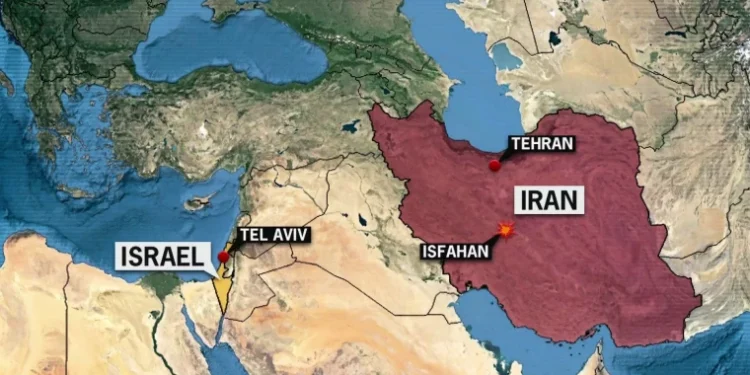Greece (Brussels Morning Newspaper), Lately, there has been significant discussion about the rivalry between Israel and Iran and the possibility of a broader military conflict in the Middle East. Despite months of destabilization for the region’s security and Iran’s attack on Israel, many describe what I also discussed in a previous article of mine. They refer to it as an isolated attack, a regional incident of a regional rivalry, or strategic operations.
The relationship between Iran and Israel has evolved through four main phases: an ambivalent period until 1953, a friendly era under the Pahlavi dynasty, a period of worsening relations following the Iranian Revolution, and ongoing hostility since the Gulf War’s end in 1991. Despite initially recognizing Israel, Iran severed ties after the revolution, leading to escalating tensions. This enmity intensified in the 1990s, fueled by rhetoric and actions such as Iran’s nuclear program and support for groups like Hezbollah, countered by alleged covert Israeli operations. Their ongoing proxy conflict has reshaped Middle Eastern geopolitics, featuring confrontations, support for opposing factions, and cyber warfare.
One More time
On October 7th, 2023, Hamas initiated a surprise operation named Operation Al-Aqsa Flood within southern Israel. While Iran denied any prior knowledge or involvement in the attack, Israel consistently accused Iran of supporting Hamas, which is part of the so-called axis of resistance—a loose alliance led by Tehran. This alliance includes Lebanon’s Hezbollah, Yemen’s Houthi rebel groups, the Syrian government, and various groups in Iraq. Throughout its conflict with Gaza, Israel has encountered friction with multiple factions within this axis.
Mohammad Bagheri, the head of the Iranian armed forces, has called for Western nations to clarify their activities in the Strait of Hormuz, which is far from their territorial waters. Bagheri emphasized that Iran and the nations located south of the Persian Gulf possess the capability to collaborate in securing the Persian Gulf, the Strait of Hormuz, and the Sea of Oman. He made these remarks during a press conference.
Khamenei emphasized the need for Islamic governments to temporarily sever their political ties with Israel and urged Muslim nations to halt the flow of energy and goods to the country. As the United States deployed significant military assets to the region, including two carrier strike groups and a nuclear submarine, Iran showcased its military strength.
Lebanon’s Hezbollah and Yemen’s Houthis, backed by Iran, have been involved in cross-border clashes with Israel in solidarity with Hamas fighters. Israel reported that the Houthis seized a British-owned and Japanese-operated cargo ship in the southern Red Sea, labeling it an “Iranian act of terrorism.”
Washington vs Tehran
Tensions in the region involve both the U.S. and Iran engaging in the seizure of vessels transporting oil as part of their efforts to exert communicative blows. However, American pressure tactics, possibly with Russian encouragement, may have prompted Iran to mobilize its entire arsenal in the region and target all types of ships carrying either goods or fuel destined for the U.S., Israel, NATO, and their allies.
An Israeli airstrike near Damascus, Syria, resulted in the death of a senior adviser from Iran’s Revolutionary Guard Corps (IRGC). Another attack in the Syrian city of Baniyas claimed the life of an IRGC member and two others. Reza Zarei, the individual killed in Baniyas, was responsible for overseeing Iranian oil shipments to Syria. Analysts suggest that Israel is targeting these key figures to disrupt the connection between Tehran’s command and Iranian-affiliated actors in Syria. In a separate strike, two commanders from the Islamic Revolutionary Guards Corps were among seven casualties when the Israeli airstrike destroyed the Iranian consulate in Damascus. Brigadier General Mohammad Reza Zahedi, a prominent figure in the elite Quds Force of the IRGC, and his deputy, General Mohammad Hadi Hajriahimi, were both killed in the attack.
During a sudden escalation overnight, Iran initiated an attack it named Operation True Promise, launching over 300 drones and missiles toward Israel. Remarkably, this marked the first direct strike on Israel from Iranian territory. The Israeli military reported that the majority of the missiles were intercepted outside Israel’s borders, with assistance from the US, the United Kingdom, and France. Additionally, Jordan intercepted some of the missiles aimed at Israel as they traversed Jordanian airspace.
There’s increasing speculation about Israel’s potential response to Iran’s recent attack, which was itself retaliation for Israel’s strike on the Iranian embassy in Damascus on April 1st, resulting in the death of a high-ranking Iranian general and other officials from the Islamic Revolutionary Guard Corps. While tensions between the two nations have existed for decades, direct attacks like these have been unprecedented. Typically, conflicts have been conducted through proxy forces in the region or via intelligence operations carried out by Israel.
Taking into account all the attacks carried out by both sides, indeed, Tehran is unlikely to attack Israel again, but Tel Aviv will proceed with a military operation in the future or an intelligence move/operation that will disturb Tehran.




